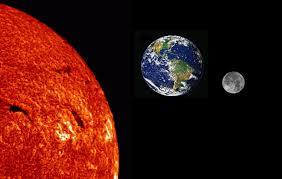Conceptual Question on Gravity

This is a question in HC Verma Concepts of Physics 1
At noon, the sun and the earth pull the objects on the earth's surface in opposite directions. At midnight, the sun and the earth pull these objects in the same direction.
Is the weight of an object, as measured by a spring balance on the earth's surface, more at midnight as compared to its weight at noon?
(Ignore all other bodies in space)
Please provide an explanation.
No vote yet
1 vote
Easy Math Editor
This discussion board is a place to discuss our Daily Challenges and the math and science related to those challenges. Explanations are more than just a solution — they should explain the steps and thinking strategies that you used to obtain the solution. Comments should further the discussion of math and science.
When posting on Brilliant:
*italics*or_italics_**bold**or__bold__paragraph 1
paragraph 2
[example link](https://brilliant.org)> This is a quote# I indented these lines # 4 spaces, and now they show # up as a code block. print "hello world"\(...\)or\[...\]to ensure proper formatting.2 \times 32^{34}a_{i-1}\frac{2}{3}\sqrt{2}\sum_{i=1}^3\sin \theta\boxed{123}Comments
Whatever will be the time , the object will be in equilibrium due to balancing of gravitational forces and gravity do not depends on time. ....It will be same every time at that place. ..It may differ at different places
Log in to reply
Balancing of which gravitational forces? The earth's and the sun's? At noon, the sun and the earth pull the objects on the earth's surface in opposite directions. At midnight, the sun and the earth pull these objects in the same direction.
Log in to reply
Earth's and the moon's gravitational forces wil reduce the effect of force to negotiable level
Theoretically yes. What you are talking about completely makes sense. I think our weight will vary with time sinusoidally but this change will be quite small. This is because,
Earth's distance from the Sun is 149,600,000 km
Radius of Earth = 6378.1 kilometers
As you can see the change in distance is very small but not negligible. Hence I completely support you. I would like to point out that even the moon will play an important role in altering the weight. In fact moon's gravitational influence leads to tides in the seas.
I am not quite sure but I think in The Brief History of Time, Hawkings has spoken about this influence of gravitational forces of infinitely many celestial bodies at a single point in space.
Log in to reply
In fact, the answer is that there will be no change in the weight.
It is analogous to the case when an astronaut feels weightless in a spaceship orbiting the earth.
The required centripetal force( or the centrifugal force, however you wish to view it) Will be provided by (equal to) the sun's gravitational pull.
Log in to reply
I did not quite understand this comment. What you were talking about (in the main part, I mean your note) is completely correct. Our weight has to change with time.
What is HC's answer?
Log in to reply
It is a short answer question, so an answer is not provided.
The earth is assumed to orbit around the sun in a circular orbit, similarly the object also orbits around the sun..
At noon the object is nearer to the sun than the center of the earth. Analogous to an astronomer in a spaceship around the earth, there is no effect of the sun's gravitational pull.
This is assuming that there are no other bodies present.
There will be slight changes due to the fact that the earth's orbit is elliptical. And due to the fact that the distance between the object and sun changes. (Same as Pinak's explanation)
Assuming a circular orbit of the earth, there will be no changes and my previous explanation holds. For an elliptical orbit, which is the actual orbit, I think Pinak is right.